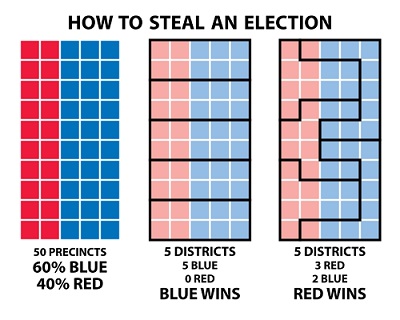
The term gerrymander gets thrown around on TV, in higher-brow political publications, by pundits and other hyper political talking heads but it’s a confusing concept that seems to be little considered by the common voter. And as it’s often confused with the less nefarious, though still problematic, procedure of redistricting (it is the progenitor of gerrymandering) which makes it doubly perplexing. They’re both issues that need some immediate addressing; gerrymandering especially so. They’re both problems that should concern any and all fans of a free and fair democratic enterprise. And they’re both problems that have, to date, not seen any true nationwide progress in fixing them.
Redistricting is, in theory, a benign entity. It’s purpose is to keep everything fair and our system of representational voting in balance. But that other smell you’re smelling? It’s not what The Rock is cooking: it’s gerrymandering. And what it smells like is dead opossum rotting on the side of the road on a miserable summer day in late July almost anywhere south of the Mason-Dixon Line. To put it more directly: it be stanky. But it’s not something the media likes to beat to death so you can be forgiven for not grasping it’s true significance.
It’s not sexy. It’s not lost e-mails or ‘covfefe.’ But it is responsible for some decidedly un-gnarly political wham-bam-thank-you-ma’ams. For instance, the 2012 election shorted the Democrats by about 18 seats in the House in accordance with their actual share of the votes that year. If that doesn’t to add it that’s because it doesn’t. Gerrymandering has a way of fumbling the numbers for those in charge of drawing the lines.

While it’s certainly true that Democrats are guilty of this illicit use of redistricting it is most certainly the Republican party that has reaped the greatest bounty of this whirlwind. I know, I know, what a revelation, right? But it’s a mighty easy thing to do when you have a unified control of twice as many states as Democrats (at least when the last congressional district maps were drawn).
The GOP has proven time and time and time again, ad nauseam, that they’re willing to shackle whatever leverage they can access and work it to the bone, public outcry and voter outrage be damned.
Look at the current face of the party that, supposedly, holds all the cards. Cowardly act after cowardly act and a considerable, downright otherworldy effort to drag their present foothold to the greatest depths possible with absolutely no consideration on the effects of future governing of America or of its people, even their own dyed-in-the-wool voters. The longer topics like gerrymandering fall by the wayside, the happier, and better off, they are.
There’s just no other way to say it. Gerrymandering is a disgusting enterprise the Republicans revel in because they can and because they’ve gotten away with it for so long, and politically unscathed at that. In fact, quite the opposite. Gerrymandering has served them extremely well and given them opportunities to extend the breadth of their power and increase their permanent numbers (at least until the next redistricting, at which it will depend on who is in power).
Why aren’t we seeing the appalled mainstream liberal outcries about these abuses outside the occasional scholarly admonishments such as when Barack Obama said, earlier this year, that “We have to end the practice of drawing our congressional districts so that politicians can pick their voters, and not the other way around.” He’s right, but who’s listening?
There were no CNN soundbites, no Wall Street Journal write-off, no FOX News calling him a left-wing, fundamentalist Muslim from Kenya who couldn’t understand the intricacies of complex concepts such as gerrymandering let alone have the right to decry its ill effect upon the political landscape. But, by god, let someone mention free college education or universal healthcare and people, whether for or against, go nuclear. But gerrywhatsit? Nah. Not so much.
Facing South, a blog/website extension of The Institute for Southern Studies, a non-profit, progressive research group focused on Southern political issues, highlights a very clear problem that was a direct result of extreme gerrymandering:
…after the 2012 and 2014 elections, the consequence of gerrymandering in the South has resulted in a significant underrepresentation of Democrats among the region’s congressional delegates. In 2012, 41 percent of Southerners voted for a Democrat, but Democrats made up only 29 percent of U.S. representatives from the South. That meant Southern Democratic voters were four times more likely to be underrepresented in Congress than the national average.
It’s in the number, folks. If you can’t see the unfairness of what’s going on here, then I know exactly where your allegiance lies. And if that’s the case, don’t worry about. This is fake news anyway, right?
So what’s to be done? Good question. And, ultimately, the answer is: who knows? The recent decision handed down by the Supreme Court in Cooper v. Harris concerning gerrymandering in North Carolina is a small beacon of light at the end of a very dark tunnel. In a 5-3 vote, SCOTUS ruled that North Carolina legislators (Republicans) violated constitutional law by using redistricting to soften the voting clout of minorities, meaning these districts will have to be redrawn. It’s been called a landmark case but you wouldn’t know it from the media’s reaction. True, we’re only talking about North Carolina’s gerrymandering problem and just two districts at that, but it feels nice to be hopeful. Though, lately, in today’s political climate, it seems feeling hopeful about such a large problem can often make a person feel awfully small.
Leave a Reply